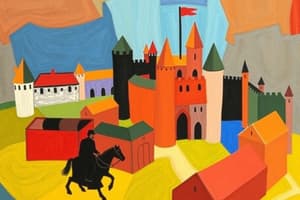Podcast
Questions and Answers
What was the primary focus of societies during the Agrarian Period?
What was the primary focus of societies during the Agrarian Period?
- Scientific advancement
- Trade and commerce
- Industrial development
- Production of food through agriculture (correct)
Peasants in the Middle Ages generally viewed landowners as providers and protectors.
Peasants in the Middle Ages generally viewed landowners as providers and protectors.
True (A)
In agrarian societies, how did the perspectives differ between landowners and peasants?
In agrarian societies, how did the perspectives differ between landowners and peasants?
Landowners viewed land as a source of wealth and power, while peasants focused on daily survival and labor.
During the Middle Ages, society was centered around land, the Church, and ______ obligations.
During the Middle Ages, society was centered around land, the Church, and ______ obligations.
Match the social classes to their roles during the agrarian period:
Match the social classes to their roles during the agrarian period:
What did the peasants owe to their lords in exchange for protection?
What did the peasants owe to their lords in exchange for protection?
The relationship between faith and reason was viewed as conflicting during the Middle Ages.
The relationship between faith and reason was viewed as conflicting during the Middle Ages.
What was the role of the clergy in the Middle Ages?
What was the role of the clergy in the Middle Ages?
What was the primary feature of the 17th Century Philosophy?
What was the primary feature of the 17th Century Philosophy?
The Vitruvian Man illustrates the harmony between bodily structures as God's flawed creation.
The Vitruvian Man illustrates the harmony between bodily structures as God's flawed creation.
Who is one of the earliest proponents of Rationalism?
Who is one of the earliest proponents of Rationalism?
The age of Empiricism is often associated with the philosophers John Locke, David Hume, and ___.
The age of Empiricism is often associated with the philosophers John Locke, David Hume, and ___.
What concept does Immanuel Kant's philosophy focus on?
What concept does Immanuel Kant's philosophy focus on?
Naturalism during the 17th Century Philosophy indicated a belief that human beings thrive under a weak, democratic government.
Naturalism during the 17th Century Philosophy indicated a belief that human beings thrive under a weak, democratic government.
Leonardo da Vinci's Vitruvian Man demonstrates the application of geometry and ______.
Leonardo da Vinci's Vitruvian Man demonstrates the application of geometry and ______.
Match the philosophers to their philosophical contributions:
Match the philosophers to their philosophical contributions:
Flashcards
Agrarian Period
Agrarian Period
A time period where agriculture was a central activity, and most people were farmers.
Feudalism
Feudalism
A social system where land was owned by nobility and managed through a hierarchical structure with obligations.
Land Ownership in Feudalism
Land Ownership in Feudalism
Nobility held land from the Crown, vassals from nobles, and peasants worked the land.
Peasant/Serf obligations
Peasant/Serf obligations
Signup and view all the flashcards
Noble perspective
Noble perspective
Signup and view all the flashcards
Clergy's role
Clergy's role
Signup and view all the flashcards
Peasant perspective
Peasant perspective
Signup and view all the flashcards
Serf's perspective
Serf's perspective
Signup and view all the flashcards
Renaissance
Renaissance
Signup and view all the flashcards
Vitruvian Man
Vitruvian Man
Signup and view all the flashcards
Rationalism
Rationalism
Signup and view all the flashcards
Empiricism
Empiricism
Signup and view all the flashcards
Naturalism
Naturalism
Signup and view all the flashcards
Critical Idealism
Critical Idealism
Signup and view all the flashcards
17th Century Philosophy
17th Century Philosophy
Signup and view all the flashcards
18th Century Philosophy
18th Century Philosophy
Signup and view all the flashcards
Study Notes
Agrarian Period
- Agriculture was central to human societies
- Large numbers of people worked the land
Modern Ages - Way of Life: Feudalism
- Nobility held land from the Crown in exchange for military service
- Vassals were tenants of nobles
- Peasants (villeins/serfs) worked the land for nobles
- Peasants provided homage, labor, and a share of the produce
- Peasants were typically farmers or laborers
- Faith and reason were interconnected
Perspectives in Agrarian Societies
- Society was shaped by agriculture
- Farmers valued stability and nature
- Landowners viewed land as wealth and power
- Peasants focused on survival and were often tied to the land
Middle Ages
- Society was hierarchical, centered around land, the Church, and feudal obligations
- Nobles saw power as divinely ordained, focused on land, wealth, and control
- Clergy held spiritual and political influence
- Peasants were tied to the land for survival, and saw their lives as part of a divine plan
- Merchants and townsfolk valued trade and individual success
Studying That Suits You
Use AI to generate personalized quizzes and flashcards to suit your learning preferences.
Description
Explore the intricacies of agrarian societies during the feudal period. This quiz covers the roles of nobility, vassals, and peasants, along with their perspectives on land and survival. Understand how agriculture shaped social structures and values in the Middle Ages.




